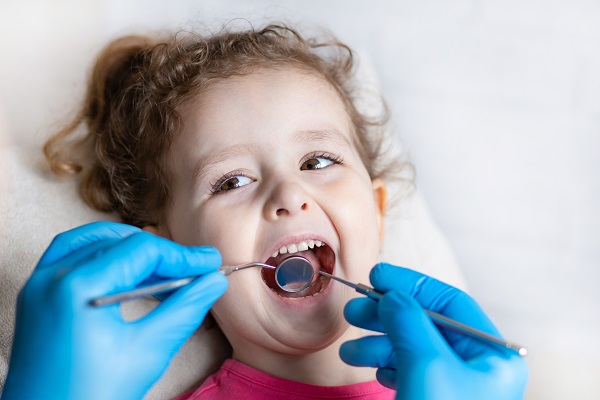Pediatric Dental Benefits of Calcium and Vitamins for Infant Teeth

Brushing, flossing, and regular checkups are necessary for good pediatric dental health. Consuming enough of the right nutrients, such as vitamins and minerals, can also play a huge role in developing healthy teeth and gums. However, it can be difficult to get young kids to eat healthy foods that contain these important nutrients. However, there are some easy ways to introduce them. When parents learn how to increase a child's nutrient intake, many oral health benefits are likely to follow.
Vitamins and nutrients for healthier teeth
The human body needs a variety of nutrients to stay healthy, especially during the growth and development phases of childhood. Because children are more prone to tooth decay, adding these vitamins and minerals to kids' diets can help protect their teeth against cavities.
Calcium
This important mineral helps strengthen bones and teeth for better protection against damage. Calcium also strengthens tooth enamel, which helps defend teeth against the harmful bacteria that can cause cavities.
Vitamin D
The body needs vitamin D to properly absorb all of the calcium it consumes. Without it, teeth are much more likely to become weak and brittle and are also more susceptible to decay.
Phosphorus
This mineral works alongside calcium to build strong teeth. Phosphorus is especially significant because it also helps rebuild tooth enamel. This is an important step in pediatric dental cavity prevention; weakened or damaged tooth enamel can allow bacteria to pass through to internal tissues and structures, leading to decay, infection, and even tooth loss.
Other vitamins
Many other nutrients can help children develop a stronger and healthier smile. These include:
- Vitamin A for better saliva production
- Vitamin C for improved healing and better protection against infection
- Potassium for proper clotting (when gums bleed) and increased mineralization of the teeth
- Vitamin E to limit periodontal inflammation
- B vitamins to treat and prevent mouth sores
- Iron for better gum health
Increasing a child's nutrient intake
To help ensure children are getting all of the vitamins and minerals needed for healthy teeth, follow these simple tips.
Drink plenty of milk
This beverage is popular with most children and contains many of the nutrients needed for strong bones and healthy teeth, including calcium, vitamin D, and phosphorus. Most medical professionals recommend two to three cups a day for children of all ages.
Play in the sunshine
Vitamin D is present in a variety of foods, but one of the easiest ways to get a big dose is to get out in the sun. Playing outdoors has a host of other health benefits as well. Be sure to use proper protection to prevent sunburn.
Sneak in veggies and fruits
Fruits and vegetables, especially organic ones, are great sources of vitamins and many of the other nutrients important for good oral health. It is often easier to get your young child to eat fruit, but vegetables may be a bit trickier. However, there are ways to get your child to eat more of them. For babies just starting with solid foods, pureeing fruits and vegetables is an easy way, and if you try a wide variety, you will probably find that your baby has some favorites.
For children, smoothies are a good way to get them to consume milk, fruit, and even some veggies. Combine milk with fruits like strawberries, bananas, and berries, and then add some spinach. Once it is blended, the spinach is undetectable.
You can also puree a number of vegetables into soups and sauces. Try tomatoes, onions, and peppers.
If your child likes to dip things, cut up a variety of vegetables and serve them with hummus, guacamole, or other healthy dips. Fruit can be dipped into sweetened cream cheese or yogurt.
Try a vitamin supplement
When children struggle to eat enough fruits, vegetables, and lean protein, it may be time to consider a multivitamin or nutrition supplement to help fill in the gaps. Parents should always discuss dietary changes and any supplements with a health professional before trying something new.
Conclusion
Children need a nourishing and varied diet for proper growth and development. The right nutrients can also promote stronger teeth and healthier gums for a lower risk of tooth decay and gum disease. Therefore, ensuring a child consumes enough vitamins and minerals is an important part of pediatric dental health that should not be overlooked. If your child is picky, get creative and find fun ways to incorporate them into daily foods.
Request an appointment here: https://nettsmiles.com or call Nett Pediatric Dentistry & Orthodontics at (623) 759-7658 for an appointment in our Phoenix office.
Check out what others are saying about our dental services on Yelp: Pediatric Dentist in Phoenix, AZ.
Recent Posts
In pediatric dentistry, dentists assess how certain food types affect oral health and make recommendations accordingly. Common childhood snacks can harm teeth by breaking down enamel and contributing to periodontal diseases, such as sugar-filled yogurt packs, cookies, and citrus fruits.This review takes a closer look at snacks parents can provide for their children that are…
Once teething starts, you should pay close attention to your child's teeth to avoid tooth decay, cavities, and other oral health problems. A dentist specializing in pediatric dentistry might advise against pacifiers and other items that might interfere with the healthy development of their oral tissues. Sucking on a pacifier is common among infants and…
Pediatric dentistry is a vital part of a child's healthcare team. They are responsible for the oral health of babies, children, and adolescents. A pediatric dentist has the education and experience to care for a child's unique dental needs. In addition, they can provide preventive care, diagnosis, and treatment of various dental problems.Parents need to…
Pediatric dentistry works with parents and children to keep gums and teeth healthy. Brushing daily may be an important part of oral care, but it is not enough. Flossing must be a habit in kids as well. If you want to know more about the importance of daily flossing, here are the details straight from…


